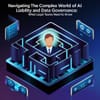As artificial intelligence (AI) becomes increasingly integral to business operations, legal departments are grappling with new challenges related to AI liability and data governance. With AI systems making more decisions and handling sensitive information, understanding the legal implications of these technologies is more crucial than ever.
One of the primary concerns for legal teams is determining liability when AI systems make errors or cause harm. Traditional legal frameworks weren't designed with AI in mind, leaving many questions about who is responsible when things go wrong. For instance, if an AI-driven recommendation system gives faulty advice that leads to a financial loss, who is held accountable—the developers, the company using the AI, or the AI itself?
Data governance is another significant issue. AI systems often rely on large volumes of data to function effectively, but managing this data presents its own set of challenges. Legal departments must ensure that data collection, storage, and use comply with privacy regulations and industry standards. This includes safeguarding personal data and ensuring that AI systems are transparent about how they use data.
The complexity of these issues is compounded by the rapid pace of AI development. Legal teams must stay up-to-date with evolving regulations and industry best practices to effectively manage AI-related risks. This often involves working closely with technology experts to understand the capabilities and limitations of AI systems, as well as engaging with policymakers to shape emerging regulations.
One approach being adopted by some organizations is to establish dedicated teams or roles focused on AI governance and compliance. These teams are tasked with developing strategies to address potential legal risks and ensure that AI implementations adhere to legal and ethical standards. This proactive approach can help mitigate risks and build trust with stakeholders.
Moreover, the integration of AI into business operations requires a reevaluation of existing contracts and agreements. Legal departments need to update their contracts to address AI-related issues, such as data ownership, intellectual property rights, and liability clauses. Clear and comprehensive agreements can help prevent disputes and clarify responsibilities.
As AI continues to evolve, the legal landscape surrounding it will also change. Legal departments will need to be adaptable and forward-thinking to navigate these complexities. By staying informed and prepared, they can help their organizations leverage the benefits of AI while minimizing legal risks and ensuring compliance with data governance standards.


